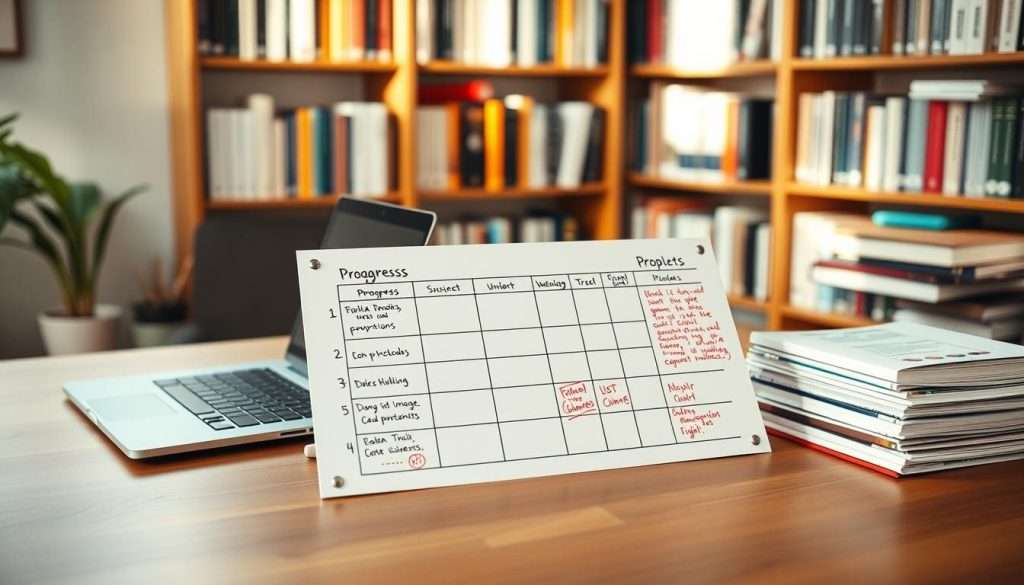In today’s fast world, staying ahead means a commitment to lifelong learning. Taking charge of your learning is key for growth and development.
By choosing self-directed learning, you can explore topics you love at your own speed. This method boosts your knowledge and gives you a sense of achievement and drive.
Starting this journey, you’ll see that personal development never stops. It’s about being active and finding chances that match your goals.
Key Takeaways
- Self-education is key to unlocking your full potential.
- Lifelong learning helps you stay ahead in a rapidly changing world.
- Personal development is a continuous process that requires proactive effort.
- Embracing self-directed learning enhances your knowledge and motivation.
- Setting your own pace allows for a more effective learning experience.
The Power of Self-Education in Today’s World
In today’s fast world, self-education is key for growth. It helps us keep up with new tech and job changes. Learning never stops, and it’s more important than ever.
Why Traditional Education Is No Longer Enough
Old-school education is a good start, but it’s not enough for success today. Jobs change fast, and we need to keep learning. Continuous learning helps us stay ahead in the job market.
A World Economic Forum report says by 2025, many jobs will need skills we don’t have yet. This shows how important self-education is for learning new skills and keeping up with tech.
How Self-Education Drives Career Advancement
Self-education helps us get new skills and stay in the know. It makes us better at our jobs and opens doors to new opportunities.
The Economic Value of Continuous Learning
Learning for life has big economic benefits. A Federal Reserve study shows better-educated workers earn more and find jobs easier. Self-education can boost your career and wallet.
| Education Level | Unemployment Rate | Median Earnings |
|---|---|---|
| Less than a High School Diploma | 4.6% | $25,636 |
| High School Diploma | 3.4% | $35,984 |
| Bachelor’s Degree | 2.2% | $65,000 |
| Advanced Degree | 1.9% | $80,000 |
“The beautiful thing about learning is that nobody can take it away from you.” – B.B. King
This quote shows the lasting power of self-education. It unlocks our potential, helps us advance in our careers, and brings economic benefits.
Understanding the Self-Education Mindset
Self-education is more than just learning new things. It’s about having a mindset that loves learning forever. To really get the most out of self-education, you need to understand and adopt the right mindset. This includes several important parts that help you learn well and keep learning.
Developing a Growth Mindset for Lifelong Learning
A growth mindset is key to good self-education. This idea, brought up by Carol Dweck, says you can grow your skills with hard work and dedication. Cultivating a growth mindset lets you tackle tough challenges and keep going even when it’s hard. It shows that your smarts and skills can grow over time.
Embracing Curiosity as Your Learning Engine
Curiosity drives learning. When you’re curious, you dive deeper into what you’re learning. Embracing curiosity means being open to new things and asking lots of questions. This makes learning fun and keeps you motivated.
Setting Realistic Expectations for Your Journey
It’s important to set goals that are realistic for your self-education. This means knowing how fast you learn, setting goals you can reach, and being patient with your progress.
Balancing Ambition with Sustainability
It’s key to balance how ambitious you are with how long you can keep up your learning plan. Setting goals that are too high can burn you out. Goals that are too low won’t challenge you enough.
Preparing for the Learning Plateau
Every learner hits a plateau at some point. Getting ready for this means knowing it’s normal and having plans to get past it. This could mean trying a new way of learning or looking for more resources.
| Aspect | Description | Benefit |
|---|---|---|
| Growth Mindset | Belief that abilities can be developed | Resilience and persistence |
| Curiosity | Openness to new experiences and questions | Deeper engagement and motivation |
| Realistic Expectations | Understanding learning pace and achievable goals | Sustainable progress and reduced frustration |
Assessing Your Learning Style and Needs
Starting your self-education journey means understanding what works for you. It’s about finding out what learning methods suit you best.
Identifying Your Personal Learning Preferences
Everyone learns in their own way. Some like to see things, others to hear them, and some by doing. Knowing how you learn helps you pick the best educational tools.
Visual, Auditory, Reading, or Kinesthetic
Studies show we can be visual, auditory, reading/writing, or kinesthetic learners. For example, if you’re visual, watching videos or using infographics might help you learn.
Solo vs. Collaborative Learning
Do you learn better alone or with others? Some people do great in collaborative environments, while others prefer learning by themselves. Knowing this helps you find the right self education resources.
Conducting a Personal Skills Audit
To learn effectively, you need to know your strengths and weaknesses. A personal skills audit helps you see what you’re good at and what you need to work on. It also helps you decide what to learn first.
Defining Clear Learning Objectives
After figuring out your learning style and needs, set clear skill development goals. What do you want to achieve through self-education? Having specific goals keeps you motivated and lets you see how far you’ve come.
Creating Your Self-Education Plan
Self-education is more than just learning new things. It’s about making a plan to reach your goals. A good plan keeps you focused and motivated, helping you achieve what you want.
Step 1: Designing a Realistic Learning Schedule
First, create a realistic learning schedule that fits your life. Look at your daily and weekly plans. Find times when you can learn without feeling rushed.
For example, if you wake up early, learning for 30 minutes in the morning might work better than trying to learn all at once on the weekend.
Step 2: Selecting the Right Resources for Your Goals
After setting your schedule, pick the right resources for learning. This could be online courses on sites like Coursera or Udemy, educational podcasts, or books from your library.

Think about what resources will help you reach your goals. For instance, if you want to get better at coding, online coding challenges might be better than just reading about it.
Step 3: Building in Accountability Systems
Building accountability is key to staying on track. Share your goals with someone you trust and ask them to check in with you. You could also join a study group or find an online community with similar goals.
Step 4: Planning for Review and Reinforcement
Lastly, plan for reviewing and reinforcing what you’ve learned. Set up regular review times. Use flashcards or practice quizzes to help you remember.
By following these steps, you can make a detailed self-education plan. This plan will help you succeed in your self improvement journey.
Essential Resources for Effective Self Education
Finding the right educational resources is key to self-education. There are many options out there. You can pick what works best for you and your goals.
Online Learning Platforms and Courses
Online learning platforms have changed how we learn. Sites like Coursera, Udemy, and edX have lots of courses. It’s important to know the difference between free and paid courses.
Free vs. Paid Educational Resources
Free resources are a good start. But, paid courses often offer more. They include certifications and direct teacher interaction.
Evaluating Course Quality and Credibility
Make sure you choose quality courses. Look for ones with good reviews, known instructors, and relevant content.
Books, Podcasts, and Traditional Media
Books and podcasts are great alternatives. They’re perfect for those who learn better through listening or seeing.
Communities and Networking Opportunities
Being part of study groups or finding mentors can help a lot. Social media is also good for meeting others who learn like you.
Finding Mentors and Study Groups
Search for online forums, social media groups, or local meetups. Find groups that match your learning goals.
Leveraging Social Media for Learning
Follow teachers, join learning groups, and take part in discussions. This way, you can learn a lot on social media.
| Resource Type | Examples | Benefits |
|---|---|---|
| Online Courses | Coursera, Udemy, edX | Structured learning, certifications |
| Traditional Media | Books, Podcasts | Flexible, self-paced learning |
| Communities | Social Media Groups, Forums | Networking, support |
Developing Crucial Self-Learning Skills
Starting your self-education journey means learning the right skills. Self-directed learning is more than just reading. It’s about learning how to find, understand, and keep information.
Mastering Information Literacy in the Digital Age
In today’s world, information literacy is key. It’s not just about finding info; it’s about knowing what’s true. Howard Rheingold said, “Knowing what’s real is the most important skill today.”
Effective Note-Taking Techniques for Retention
Good note-taking is essential for learning on your own. It’s not just about writing down facts. It’s about keeping and understanding them.
Digital vs. Handwritten Notes
There’s a debate on digital vs. handwritten notes. Digital notes are easy to access, but studies show handwritten notes help more. Try both to see what works for you.
Spaced Repetition Systems
Spaced repetition helps you remember things better. It involves reviewing material at longer intervals. Tools like Anki make it easy to use this method.
Critical Thinking and Analysis
Critical thinking lets you analyze info and make smart choices. It’s vital for learning on your own. To get better, question things, check evidence, and look at different views.
“The mark of a true educator is not so much the ability to teach, but to make the student think.”
Time Management for Self-Directed Learners
Managing your time well is crucial for learning by yourself. Without a plan, you might put things off or feel overwhelmed. Make a learning schedule, set goals, and use calendars or apps to stay on track.
By learning these key skills, you’ll be ready to tackle your educational path and reach your goals.
Implementing Active Learning Strategies for Skill Development
To master new skills, you must do more than just read or listen. Active learning means engaging with what you learn, applying it, and getting feedback. This approach helps you truly understand and improve.
The Practice of Deliberate Learning
Deliberate learning focuses on improving specific skills. It means identifying areas for improvement and concentrating on them. This way, you can see big improvements quickly.
To practice deliberate learning, follow these steps:
- Set clear goals for what you want to achieve
- Break down complex skills into smaller, manageable parts
- Focus on the most challenging aspects of the skill
- Get feedback from others or through self-assessment
Teaching Others to Reinforce Knowledge
Teaching others is a great way to solidify your knowledge. When you teach, you have to organize your thoughts and explain complex ideas simply. This helps you understand and retain information better.
Teaching can be in many ways, like mentoring or creating tutorials. Even explaining a concept to a friend can help. Teaching forces you to solidify your own understanding and shows where you need more practice.
Project-Based Learning Approaches
Project-based learning applies your skills to real-world projects. It helps you develop practical skills and build a portfolio of your work. This portfolio shows your abilities to others.
Creating Real-World Applications
For the best results, focus on projects that are relevant to your field or interests. This makes your learning more meaningful and applicable.
Building a Portfolio of Work
As you finish projects, build a portfolio to showcase your work. A strong portfolio is key when showing your skills to employers or clients.
By using these active learning strategies, you can improve your skills faster and reach your goals more efficiently.
Measuring Progress and Adjusting Your Approach
Tracking your progress is key when you start learning on your own. It shows you’re moving towards your goals. Continuous learning means knowing how to measure and adjust your path.
Setting Milestones and Tracking Achievements
Clear milestones keep you focused. Break big goals into smaller tasks. Use a journal or app to track your progress.
Celebrate every achievement, no matter how small. It keeps you motivated.

Self-Assessment Techniques That Actually Work
Regular self-assessment is essential. Use quizzes, tests, or projects to check your understanding. Reflect on what you’ve learned and find areas to improve.
This keeps you on track and helps you make needed changes.
When and How to Pivot Your Learning Focus
Sometimes, you need to change your learning path. Recognizing when to pivot is key.
Recognizing Diminishing Returns
If your progress slows down, it’s time to change. Don’t hesitate to try new resources or methods.
Expanding into Related Knowledge Areas
As you learn, your interests might grow. Be open to exploring new topics. It can deepen your understanding and keep learning exciting.
Overcoming Common Self-Education Challenges
Self-education has many benefits, but learners face common challenges. We’ll look at these obstacles and offer ways to beat them.
Dealing with Motivation Slumps
Motivation slumps happen to everyone. To fight them, try setting up rewards or finding your “why” again.
Creating Reward Systems
Setting up rewards is easy. Treat yourself to something you love after hitting a goal. This keeps you motivated.
Finding Your “Why”
Knowing why you’re learning is key. Ask yourself what drives you. Is it for your career, personal growth, or something else? Thinking about your “why” keeps you on track.
Managing Information Overload
Today, there’s too much to learn. Focus on quality resources that match your goals.
| Resource Type | Examples | Benefits |
|---|---|---|
| Online Courses | Coursera, Udemy, edX | Structured learning, flexibility |
| Books and Podcasts | Audiobooks, educational podcasts | Convenience, multitasking |
| Communities | Online forums, study groups | Support, networking opportunities |
Balancing Self-Education with Other Responsibilities
Good time management is crucial. Make a schedule and follow it.
Handling Isolation in Self-Directed Learning
Join online groups or local study groups to fight isolation. Talking with others who have the same goals is very motivating.
Conclusion: Embracing Lifelong Self-Improvement
As we finish our journey through self-education, we hope you’re eager to keep learning. Embracing lifelong learning helps you stay ahead in today’s fast world. By focusing on personal growth, you’re investing in a better future.
We’ve talked about the key to growing, finding your learning style, and making a learning plan. We’ve also covered the important tools and skills for your learning journey. Now, it’s time to use what you’ve learned.
Remember, self-education is a journey, not just a goal. It’s about being open to new things, facing challenges, and keeping going. This way, you’ll open up new chances, reach your goals, and reach your full potential.
So, what’s next? Keep being curious, keep learning, and enjoy the journey of self-discovery. Your lifelong learning journey starts now. We’re excited to see where it leads you!

